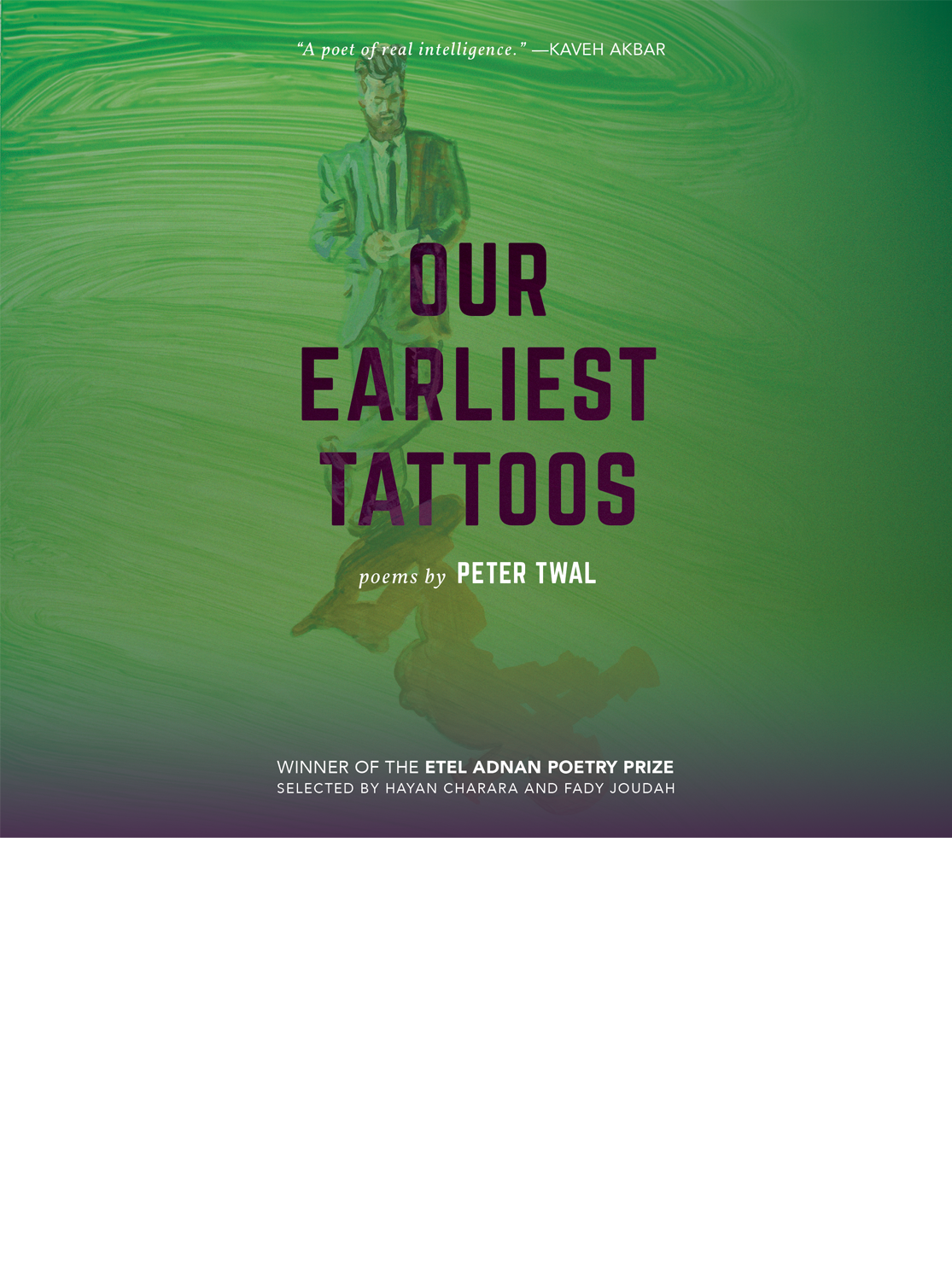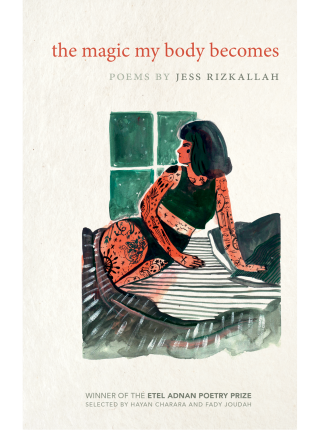Winner, 2018 Etel Adnan Poetry Prize
Because of the intense connection we feel with music, we can remember song lyrics even when we have forgotten the details of our personal lives—even when all else fails, a song can transport us back. In this sense, a song is capable of suspending time. Drawing on this perspective, Peter Twal’s playful, inventive, and wickedly sentimental debut collection takes a set of song lyrics (LCD Soundsystem’s “All My Friends”) and treats them as an artifact of memory itself, blurring the line between self and other, between past and present.
Each poem in Our Earliest Tattoos acts as a passageway from one lyric in the song to the next—the author pries these lyrics open like doors and builds whole rooms between them. As readers progress through the house he builds, they hear the song as the soundtrack to their discoveries: in one room, of party leftovers, and in another, an exploding museum of natural history.
Like memory, the characters in these poems are both present and absent. Sustained by smart phones, they are in constant communication despite always seeming to have just left the room. In one poem, the lonely Mars rover thumbs constantly through pictures on its phone; in another, Death trades in his scythe for a cell phone he uses throughout the book to send disquieting text messages. God, too, is text-happy—when the speaker asks, “Does the universe even care?” God texts back to say, “Don’t forget the twelve / bucks you owe me this year.”
Wise, funny, and wholly original, the long-lined sonnets that make up Our Earliest Tattoos celebrate the surreal, embracing the nature of memory as fragmented—as is visible in the fractured nature of the lines—and inherently bizarre.

Peter Twal is a Jordanian-American electrical engineer from Baton Rouge, Louisiana. His poems have appeared in Best New Poets, Kenyon Review, West Branch, and elsewhere. He is a recipient of the Samuel and Mary Anne Hazo Poetry Award.
Author website.
“Peter Twal’s debut collection is attuned to the desires of its language, to the minutiae of selfhood, manifesting in ways that inevitably urge its readers towards kindness. Twal writes with an intelligence and skill level that remains awe-inspiring. The world in which these poems wander is well-crafted, fascinating, and deeply personal. However, what remains most memorable to me is their generosity. The poems give us their deepest fears, their desires, their heart, and ask us only to be gentle – both with them and with ourselves.”
—Zein Sa’dedin, The Scores
Four Contemporary Poets on Voice and Visibility, Chicago Review of Books.
“Reading Peter Twal’s Our Earliest Tattoos, I kept thinking of Wallace Stevens’ famous pronouncement that a poem should ‘resist the intelligence, almost successfully.’ Throughout the book, we see a poet of real intelligence who is also intensely attuned to the wants and needs of language itself. Twal’s sky is ‘so heady, thinking the world of itself’—an earth is summoned, called into being by the ether’s own imagination. There is massive intellect pulsing through these poems, which are inflected by the Mars Rover and LCD Soundsystem and God and gravity and and and. But Twal’s genius is in the way he knows exactly when to yield the floor to imagination, which wonders and wanders through love and loneliness and friendship and grief in a million fascinating ways throughout Our Earliest Tattoos. ‘I will love my monster,’ Twal writes, and then he proceeds to show us.”
—Kaveh Akbar, author of Calling a Wolf a Wolf
“Peter Twal’s sonnet sequence explodes inside a pop song. It’s a song of youth and extinction, doomed and well dressed. His instincts are at once traditional and contemporary, his lovers garlanded with strobe light and TV snow and IEDs and birdflight. It’s a thrill to be in the presence of a poet of such a vision, a smith of such lovely smithereens.”
—Joyelle McSweeney, author of The Necropastoral
“Peter Twal’s beautiful debut makes wholly new frames for figuring a generation too alive for nostalgia and too awake for solipsism. Like a body from one of Goya’s Pinturas Negras, Twal’s speaker emerges out of his knowing impossibilities of scale into our contemporary moment all while coolly texting Death ‘Your attention/ to detail though.’ Nimble in its music and kind, this book is a reservoir of what we wish we’d said, especially when death texts back.”
—Farid Matuk, author of The Real Horse

Adopted at: Bates College
Course: ENG 292 Poetry Writing
Course Description: A course for students who wish to have practice and guidance in the writing of poetry.
Professor: Myronn Hardy
Term: Winter 2022
Adopted at: Notre Dame University
Course: ENGL 30851 Poetry Writing
Course Description: This is a course for students who are ready to immerse themselves in the strange contagious waters of poetry. We’ll read across regions, languages, communities, and time periods to connect to poetry’s aesthetic, formal, and political urgencies and possibilities, and we’ll write an array of poems of our own. Expect to write individual lyrics as well as prose poems, letters, verse plays, sound poems, collages, remixes, performance pieces, and verse plays, and to poke around in the traditional and digital media by which poems have been shared. Expect to write in- and out-of- class poems, work collaboratively on group projects and translations, present, perform, participate, and offer kind and supportive feedback on peer work., and propose and execute a final project of your own devising.
Professor: Joyelle McSweeney
Term: Spring 2019
Adopted at: Notre Dame University
Course: ENGL 20002 Introduction to Poetry Writing
Course Description: This course invites you to build on the basics, develop your technical abilities, and broaden your approaches to the form, genres, media, language, and performance of contemporary poetry. Students should expect to read and view works from a variety of periods and cultures and will generate their own poems in response to course readings and prompts as well as their own impromptu in-class writing. Students will also sharpen their critical vocabulary as they analyze assigned readings, critique peer work, and receive critiques of their poems from both peers and instructor.
Professor: Joyelle McSweeney
Term: Spring 2019




